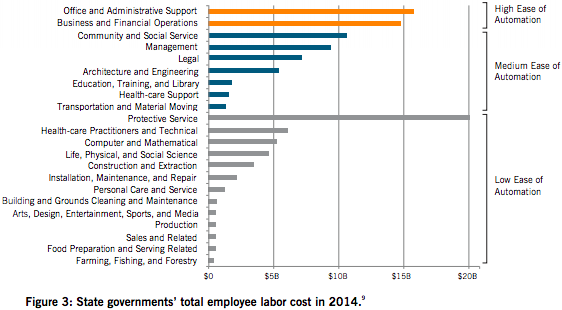Connecting state and local government leaders
A new report makes the case for reducing government headcounts and stronger CIOs.
While all states use IT to improve productivity and public services, none make it a top priority because cutting labor costs is controversial, according to a new Information Technology and Innovation Foundation report.
About $11 billion can be collectively saved over the next five years, ITIF estimates, if states replace routine government employee tasks with self-service tools, or else automate them, and optimize operations with data analytics.
Reforms such as granting state chief information officers more decision-making authority, forging public-private partnerships and incentivizing IT projects are also critical to embracing the change, according to the report.
“Imagine a leaner state government that needs fewer workers and materials to get the same or better results,” ITIF President Robert Atkinson said in an announcement. “By fully integrating technology into agency operations, governments can cut the time citizens waste standing in line or filling out forms, reduce the burden on taxpayers and make everyday services more efficient and effective. This not only cuts costs, but also makes everyone more productive—which is essential for state economic growth.”
ITIF projects state occupations with low ease of automation offer 0.5 percent productivity growth over five years, those with medium ease of automation 2.5 percent productivity growth and high ease of automation 4 percent productivity growth, as shown in this graph:

Using those savings factors, ITIF then calculated the potential five-year cost savings for every state—ranging from $38.4 million in South Dakota to $1.3 billion in California.
Cutting labor costs starts with using IT in lieu of person-to-person tasks, like Arkansas did when it replaced greeters taking vehicle registration payments at its Department of Finance and Administration buildings with kiosks built by Olathe, Kansas-based NIC. Wait times were reduced, improving citizens’ experiences and employees no longer needed to be paid to perform the service.
IT can also reduce employee and material costs by eliminating routine tasks like paperwork, which California’s Department of Corrections and Rehabilitation accomplished by taking filing digital with the Strategic Offender Management System. Paper files no longer needed to be kept on the state’s more than 137,000 inmates, saving $500,000 on paper and $1 million on storage in addition to freeing up staff time.
Performance optimization is the third and final pillar of ITIF’s IT-enabled productivity strategy, such as the state of Utah placing thousands of sensors along highways to track road conditions during inclement weather. Transportation personnel can now pinpoint where they’re of most needed in a storm to keep roads clear.
Data analytics is another form of performance optimization, like when the state of Indiana identified risk factors associated with its above-average infant mortality rate to fund policy.
“But to achieve this promise of e-government, leaders will need to clearly articulate the goal of replacing labor with technology,” Atkinson said. “They will need to take on entrenched political opposition and overcome an array of administrative challenges, including an unwillingness to increase IT investments that would generate significant returns.”
State agencies rarely track productivity, according to the report, and when they do they often fail to consider IT programs’ external benefits to the public.
The report also criticizes state policymakers for funding IT on a year-to-year budget instead of treating the projects as long-term capital investments worth financing.
Letting state CIOs take the wheel of IT-enabled reengineering by giving them control of IT budgeting and procurement is a start when improving those often decentralized processes. Outsourcing e-government services and awarding IT departments for productivity gains are two additional ways to reduce organizational barriers.
At the end of the day, reducing headcount needs to be state government’s goal, according to the report:
In short, CIOs need to be more explicit about the promise of exchanging technology for labor. They need to articulate that a key purpose of state e-government should be to cut the costs of government, including labor costs. If state policymakers want to use those savings to expand services so that no workers are laid off, that can be their choice. Nevertheless, the CIO’s role should be to drive IT-led productivity. This strategy should appeal to both sides of the political spectrum. Policymakers interested in decreasing the size of government can use the cost savings from this strategy to cut taxes. Policymakers interested in providing expanded public services can use cost savings to support additional services and investments.
By making CIOs productivity-focused rather than IT-focused across all agencies and setting dates by which they’ll no longer accept non-digital interactions, according to the report, state governments can dramatically boost citizen engagement.
Dave Nyczepir is News Editor for Government Executive’s Route Fifty.

NEXT STORY: California Mayors Champion Statewide Minimum Wage Increase




